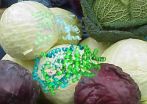(Press-News.org) GAINESVILLE, Fla. --- A new University of Florida study shows when two flowering plants are crossed to produce a new hybrid, the new species' genes are reset, allowing for greater genetic variation.
Researchers say the study, to be published March 17 in Current Biology, could lead to a better understanding of how to best grow more stable and higher yielding agricultural crops.
"We caught evolution in the act," said Doug Soltis, a distinguished professor in UF's biology department and study co-author. "New and diverse patterns of gene expression may allow the new species to rapidly adapt in new environments."
The study shows the new plant species had relaxed control of gene expression in its earliest generations. But today, after 80 years of evolution, control has been regained, allowing for the production of different patterns of gene expression in different plants. The new species was remade in UF greenhouses as well as studied in its natural habitat.
Researchers analyzed Tragopogon miscellus, a species in the daisy family that originated naturally through hybridization in the northwest U.S. about 80 years ago. The new species formed when two species introduced from Europe mated to produce a hybrid offspring. The species mated before in Europe, but the hybrids were never successful. However, in America something new happened – the number of chromosomes in the hybrid spontaneously doubled, and at once it became larger than its parents and quickly spread.
"No one had extended this to natural populations and the rapidity at which this can occur, and that's pretty astonishing," said Jonathan Wendel, professor and chairman of the department of ecology, evolution, and organismal biology at Iowa State University. "That species is such a beautiful model for that."
Hybridization with chromosome doubling is a prominent mode of species formation and through this study scientists can better understand how different plant groups originated.
"Understanding the impacts this process has on genome structure may help understand how best to breed crops for high and stable yields," said study co-author Pat Schnable, director of the Center for Plant Genomics at Iowa State University.
Before discovering their relaxed gene expression, the team had expected the artificial hybrids to exhibit a combination of the parents' genes, said study co-author Pam Soltis, curator of molecular systematics and evolutionary genetics at the Florida Museum of Natural History on the UF campus.
"What we found was a surprise," said lead author Richard Buggs of Queen Mary University of London, who worked on the study as a postdoctoral researcher at the Florida Museum. "It's as if hybridization and chromosome doubling hit a reset button on gene expression, turning them all on -- this could allow subsequent generations to experiment by switching off different genes."
The expression of the hybrid plant's genes in all tissues at all times allowed natural selection to shape what would emerge generations later, Pam Soltis said. With this form of hybridization, there is the opportunity for parental patterns to be equalized, as if the hybrid has a fresh chance to exhibit a wide variety of genetic expressions over time.
Its two parent species, Tragopogon dubius and Tragopogon pratensis, were introduced to the U.S. in the 1920s. The researchers started making the artificial hybrids in 2004 and the plants take about one year to grow from seed to being able to produce seeds, Pam Soltis said.
"Tragopogon miscellus is unique because we actually know when it originated," Pam Soltis said. "Museum collections tell us when the parent species were introduced, allowing us to infer the age of the hybrid species."
The researchers studied 144 duplicated gene pairs from the 40-generation-old Tragogogon miscellus, whose common name is goatsbeard. Because the flower of the plant only blooms for a few hours in the morning, it is often referred to as "John-go-to-bed-at-noon." It looks like a daisy except for being either purple or yellow in color.
"The Soltises are showing at the genetic level how this really important process of genome doubling generates new biological diversity," Wendel said. "This leads to new questions and the design of new experiments that can help us understand the ecological and evolutionary consequences of the genetic changes they're observing."
###
The study was funded by the National Science Foundation and co-authors include Linjing Zhang of Shanxi Normal University, formerly with UF; Jennifer Tate of Massey University, formerly with UF; Nicholas Miles and Brad Barbazuk of UF; and Lu Gao, Wu Wei and Patrick Schnable of Iowa State University.
Media contact: Leeann Bright, 352-273-2028, lbright@flmnh.ufl.edu
Writer: Danielle Torrent
Sources: Pam Soltis, 352-273-1964, psoltis@flmnh.ufl.edu
Doug Soltis, 352-273-1963, dsoltis@botany.ufl.edu
END
New research suggests that promoting active play in children's leisure time could increase the physical activity of today's children, but that such strategies might need to be tailored according to gender.
The paper, 'What is the meaning and nature of active play for today's children in the UK?' by Rowan Brockman and colleagues in the Centre for Exercise, Nutrition and Health Sciences within the School for Policy Studies at the University of Bristol, is published in the International Journal of Behavioral Nutrition and Physical Activity.
The researchers found children's ...
Along with the excitement and anticipation that come with heading off to college, freshmen often find questions of belonging lurking in the background: Am I going to make friends? Are people going to respect me? Will I fit in?
Those concerns are trickier for black students and others who are often stereotyped or outnumbered on college campuses. They have good reason to wonder whether they will belong – worries that can result in lower grades and a sense of alienation.
But when black freshmen participated in an hour-long exercise designed by Stanford psychologists to ...
Plants are continually exposed to herbivore attack. To defend themselves, they have developed sophisticated chemical defense mechanisms. Plants of the mustard family, such as thale cress (Arabidopsis thaliana), produce glucosinolates (mustard oil glucosides) to protect themselves against herbivory. Scientists know many different kinds of these molecules; they have a similar structure, but different side chains. If insect larvae feed on mustard plants, glucosinolates are hydrolyzed to form toxic isothiocyanates. Chemists call this the "mustard oil bomb".
Special enzymes ...
The Financial Express published an article on the Free Trade Agreement (FTA) talks that continue between the European Union (EU) and India. One of the most discussed and disagreed upon parts of the proposed FTA involves the need for protecting the intellectual property of pharmaceutical companies in order to promote medical innovation and investment in the development of new medicines and research. This disagreement about whether data exclusivity in the pharmaceutical sector should be included has resulted in the delay of finalizing the FTA.
Pharmaceutical companies ...
In 2006, Maria Otilia Carvalho, a researcher from the Tropical Research Institute of Portugal had an ambitious goal: to cut the huge losses of rice – a staple food crop for half of humanity – due to pests, without using toxic pesticides that are increasingly shunned by consumers worldwide. She realised she could not do it alone and turned to EUREKA to support an international collaboration to address a looming threat to world's rice supplies. Harvested rice is constantly under menace from pest insects and fungi - to avoid the pests, farmers and producers treat the rice ...
The psychological impact of natural disasters such as the Japan earthquake can be revealed in the way people inherently respond to unpredictable situations, according to a psychology expert at Queen Mary, University of London.
Dr Magda Osman, Psychology Lecturer at Queen Mary, University of London, and author of Controlling Uncertainty: Decision-making and Learning in Complex Worlds, said the disaster had a devastating immediate effect on tens of thousands of people in Japan but the true psychological impact will be felt "for some time to come".
"A disaster like the ...
A new plant species is providing an insight into how evolution works and could help improve crop plants, scientists have revealed.
The new plant species, Tragopogon miscellus, appeared in the United States 80 years ago. It came about when two species in the daisy family, introduced from Europe, mated to produce a hybrid offspring.
The species had mated before in Europe, but the hybrids were never successful. However in America something new happened. The number of chromosomes in the hybrid spontaneously doubled, and at once it became larger than its parents and quickly ...
eMaint Enterprises, headquartered in Marlton, New Jersey has provided maintenance management software solutions since 1986. Dedicated to successful CMMS implementation, eMaint is pleased to be a contributing sponsor of the CMMS-2011 Computerized Maintenance Management Summit, a learning and networking event designed for those seeking to implement a new CMMS/EAM or reimplement an existing CMMS/EAM for more effective maintenance management and decision support. The Summit will take place at the Reliability Performance Institute in Fort Myers, Florida on April 11 - 13, 2011.
eMaint's ...
A study by the Complutense University of Madrid (UCM), analysing the impact of the labour reforms introduced over the past 30 years and the living conditions of new generations, asserts that these reforms have been the origin and cause of the current development model based on the exploitation of young people.
"The study indicates that the Spanish economic development model over the past three decades – with high rates of economic growth and job creation – is based on the 'over-exploitation of the youngest generations of workers'", Pablo López Calle, author of the paper, ...
The tendency to perceive others as "us versus them" isn't exclusively human but appears to be shared by our primate cousins, a new study led by Yale researchers has found.
In a series of ingenious experiments, Yale researchers led by psychologist Laurie Santos showed that monkeys treat individuals from outside their groups with the same suspicion and dislike as their human cousins tend to treat outsiders, suggesting that the roots of human intergroup conflict may be evolutionarily quite ancient.
The findings are reported in the March issue of the Journal of Personality ...


